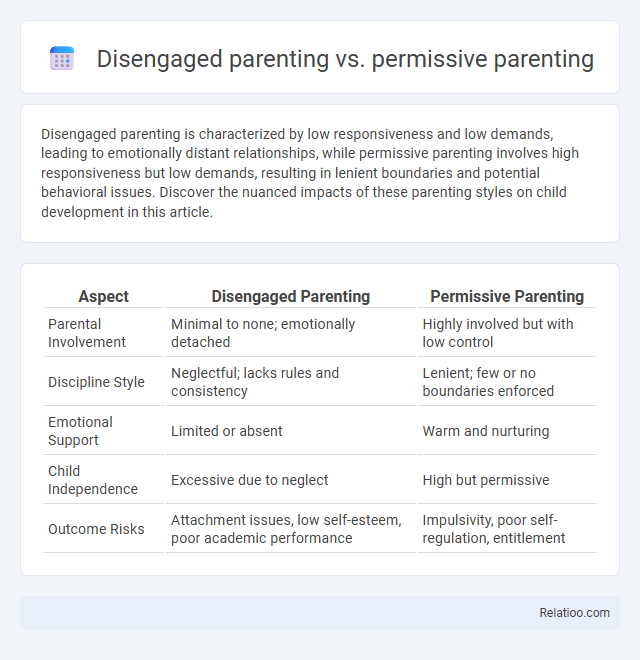Disengaged parenting is characterized by low responsiveness and low demands, leading to emotionally distant relationships, while permissive parenting involves high responsiveness but low demands, resulting in lenient boundaries and potential behavioral issues. Discover the nuanced impacts of these parenting styles on child development in this article.
Table of Comparison
| Aspect | Disengaged Parenting | Permissive Parenting |
|---|---|---|
| Parental Involvement | Minimal to none; emotionally detached | Highly involved but with low control |
| Discipline Style | Neglectful; lacks rules and consistency | Lenient; few or no boundaries enforced |
| Emotional Support | Limited or absent | Warm and nurturing |
| Child Independence | Excessive due to neglect | High but permissive |
| Outcome Risks | Attachment issues, low self-esteem, poor academic performance | Impulsivity, poor self-regulation, entitlement |
Understanding Disengaged Parenting
Disengaged parenting is characterized by low responsiveness and low demands, where parents provide minimal emotional support and supervision, leading to potential developmental and behavioral issues in children. Unlike permissive parenting, which offers high warmth but low control, disengaged parents are often indifferent or neglectful, resulting in limited involvement in their child's life. Understanding disengaged parenting helps identify risks such as poor social skills, academic struggles, and increased vulnerability to substance abuse in affected children.
Defining Permissive Parenting
Permissive parenting is characterized by high responsiveness combined with low demandingness, where parents are lenient and often avoid setting firm boundaries or enforcing rules. Unlike disengaged parenting, which involves neglect and lack of responsiveness, permissive parents actively engage with their children but prioritize freedom and self-expression over discipline. Your understanding of permissive parenting helps highlight the balance between nurturing warmth and the need for consistent guidance in child development.
Core Differences Between Disengaged and Permissive Parents
Disengaged parenting is characterized by a lack of responsiveness and minimal involvement in a child's life, while permissive parenting involves high responsiveness but low demands or control. Your child may experience emotional neglect under disengaged parenting, whereas permissive parents may struggle with setting boundaries, leading to poor self-discipline. Understanding these core differences highlights the impact on your child's development, including emotional security and behavior management.
Emotional Impact on Children
Disengaged parenting often leads to children feeling neglected and emotionally unsupported, resulting in low self-esteem and difficulties forming secure attachments. Permissive parenting may cause children to struggle with self-discipline and emotional regulation due to a lack of consistent boundaries. Your child's emotional development is most positively influenced by balanced parenting that provides both warmth and structure.
Behavioral Outcomes in Kids
Disengaged parenting often results in children exhibiting low self-esteem, poor social skills, and increased risk of substance abuse due to lack of emotional support and guidance. Permissive parenting tends to produce children who struggle with authority, display impulsive behavior, and have difficulty with self-discipline because of inconsistent boundaries. In comparison, authoritative parenting, characterized by balanced responsiveness and clear rules, consistently fosters higher academic performance, emotional regulation, and positive social interactions in children.
Root Causes and Contributing Factors
Disengaged parenting often stems from emotional unavailability, stress, or lack of resources, leading to minimal interaction and supervision. Permissive parenting arises from a desire to avoid conflict and maintain child approval, influenced by parents' own upbringing or cultural shifts favoring freedom and self-expression. Both styles reflect inconsistent boundaries, but disengaged parenting is characterized by neglect due to parental burnout or external pressures, while permissive parenting results from overindulgence and leniency driven by fears of authoritarian consequences.
Signs of Disengaged Parenting
Signs of disengaged parenting include consistent neglect, minimal emotional involvement, and lack of supervision or guidance, leading to children feeling unsupported and developing low self-esteem. Unlike permissive parenting, which is characterized by leniency and indulgence, disengaged parents often fail to meet their child's basic needs and show little interest in their daily lives. Your awareness of these signs can be crucial in identifying and addressing the negative impact on your child's emotional and psychological development.
Indicators of Permissive Parenting
Permissive parenting is characterized by a high level of warmth but a low level of discipline, where parents rarely enforce rules or set boundaries, leading to children who may struggle with self-control and authority. You might notice indicators such as parents allowing children to make all the decisions, inconsistent enforcement of rules, and avoidance of confrontation to keep peace. Unlike disengaged parenting, which is marked by neglect and lack of involvement, permissive parenting involves active emotional participation without the structure necessary for balanced development.
Long-Term Effects into Adulthood
Disengaged parenting often leads to adults with low self-esteem, poor emotional regulation, and difficulties in forming stable relationships due to a lack of parental involvement and support during childhood. Permissive parenting tends to result in adults who struggle with self-discipline, impulsivity, and entitlement, as boundaries and consequences were rarely enforced growing up. In contrast, authoritative parenting, characterized by balanced warmth and structure, is linked to healthier emotional development, social competence, and higher academic and career success in adulthood.
Effective Strategies for Positive Parenting
Effective strategies for positive parenting emphasize consistent communication, establishing clear boundaries, and nurturing emotional connection to avoid pitfalls associated with disengaged, permissive, and authoritarian parenting styles. You can foster a balanced approach by combining warmth with appropriate discipline, promoting responsibility, and modeling respectful behavior. Prioritizing active involvement in your child's life supports healthy development and strengthens your parent-child relationship.

Infographic: Disengaged parenting vs Permissive parenting
 relatioo.com
relatioo.com